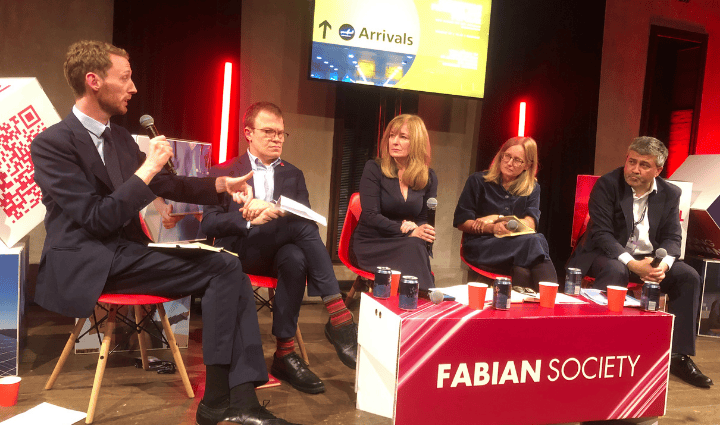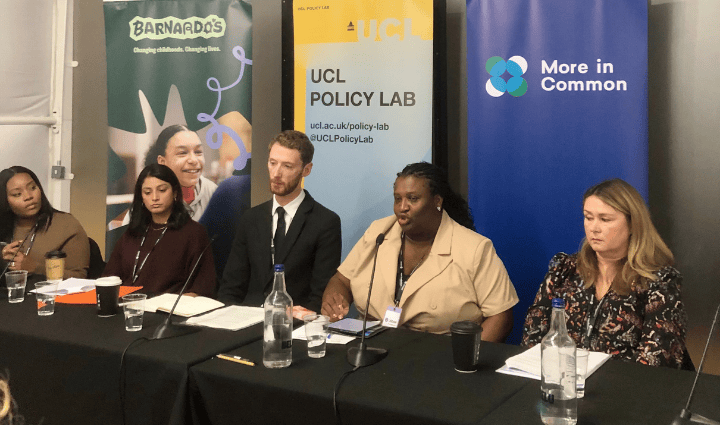Labour Party Conference 2025: bringing migrant workers to the table
For the third year in a row, we attended the Labour Party Conference to represent the interests of migrant and vulnerable workers. It’s hard to overstate how visibly the mood had changed. If last year every fringe event started with a celebration of Labour’s landslide victory in the general elections, this time the words “Reform threat” were on everyone’s lips.
This has real implications for policy. The work migration system is seriously flawed. We have a system that ties migrants to their jobs and punishes them for reporting exploitative employers by ending their visas, yet lets those same employers walk away with no penalties or charges. This seemed lost on the government, who is more concerned with appearing tough on migration than engaging with the reality of migration and migrants’ experiences.
The silver lining was that there was significantly more empathy for migrant workers’ vulnerabilities from trade unions, and from MPs who recognised that plugging safeguarding gaps in the work migration system is necessary to achieve wider strategic objectives, including preventing modern slavery, delivering the New Deal for Working People, and halving violence against women and girls. Maybe they didn’t get whipped as hard; or maybe they just saw migrants as equal stakeholders.
One thing is clear. At a time when the government is set on establishing a brand of “patriotic progressivism”, our best hope for achieving vital protections for migrants might be to show their role as workers, carers, and agents of change - who are not competing with, but critical to the government’s strategic goals.

Chris Murray, MP, speaks at an event "How should the left approach immigration?" hosted by The Fabian Society.
The work migration conversation that never happened
There were some significant absences from this year’s fringe events. For the first time in three years, the Minister for Migration and Citizenship, currently Mike Tapp, was entirely absent from scheduled events. Instead, nearly all of the five events that centered on migration were attended by Chris Murray MP, a member of the Home Affairs Committee, or Tony Vaughan MP, who is a qualified lawyer with experience of cases involving immigration and human-trafficking.
There was no mention of the well-documented exploitation of migrant workers by their visa sponsors, or the white paper’s promise to explore introducing tougher penalties when these incidents occur. Not a single panelist mentioned the other white paper proposal to give workers more flexibility to change employers – until we pressed them on it from the audience.
Conversations focused instead on the government’s proposal to restrict routes to settlement. This is arguably the most harmful and unexpected white paper proposal. Worryingly, it seeks to project an image of control, but appears wholly removed from the reality of migration and the life-changing consequences it could set in motion for so many.
The things we can agree on
There were some facts the government could agree with us on. Reform and their far-right ideology are a real threat to migrant communities. Applying changes to settlement retroactively would be callous.
Human Rights “represent the best of us”, as Attorney General Richard Hermer put it, and the government has no plans to exit the European Convention of Human Rights. But in other ways, it felt like our approaches to migration rested on fundamentally different readings.
Core misunderstandings that must be set right
The government’s call to restrict routes to settlement is rooted in three core misunderstandings that were repeated by some MPs:
1. Migrant numbers are too high. Aside from the fact that how much migration is enough is an inherently political question, net migration is decreasing and this trend is projected to continue. Work migration in particular has decreased, as the Home Office applied more stringent due diligence checks against sponsors, particularly in the care sector.
2. Migrants don’t speak English and this prevents their integration. In fact, the work visas that most people arrive on include strict English language requirements, and the white paper proposed adding new English language requirements to the dependent partners of people or work or study visas too.
3. Migrants don’t contribute enough. With the exception of humanitarian routes, which only account for a small proportion of arrivals, virtually all visas require main applicants to contribute, whether it is by having a job that meets stringent salary requirements, or taking up a course at a recognised education institution and paying hefty tuition fees.
We were left with a strong sense of the need to reclaim the truth about migrants, and this is exactly what we and colleagues across the sector have agreed to do once the consultation is launched. If there was one silver lining, it is that the migration charity sector seems more united than ever, and further allies may yet join this movement.
Our message is clear: extending routes to settlement is a wholly unnecessary, harmful policy proposal, that will only risk more exploitation, increase poverty, and deepen racial inequality.
The alliances we can build
We were encouraged to see a wide range of people recognise migrant workers’ vulnerabilities, and agree to work with us to improve the things that really matter.
- Kate Dearden MP, the new Minister for Employment Rights, agreed that the new Fair Work Agency should not just be a recipient of worker grievances, but actively put pressure on the Home Office to address the power imbalance inherent in the work-sponsorship system. We look forward to working more with Kate.
- Jess Phillips MP, the Minister for Safeguarding and Violence Against Women and Girls, cut to the truth of the Modern Slavery system, when she described it “has no heart, and it needs to put victims at the centre”, acknowledging that freedom looks very differently for British and migrant victims. We agree, and welcome her call to be bold in our submissions to the call for evidence on victim identification.
We also welcome the interventions of unions, which are increasingly vocal in their support for migrant workers, and their calls for work migration reform.
-
Dr Tom Dolphin, chair of the British Medical Association (BMA) pointed out that 35% of BMA members are from overseas, and they need certainty from the government to be able to confidently build their lives in the UK. The immigration system needs to be informed by workplace planning, which hasn’t been done.
-
In the same session, Professor Nicola Ranger, General Secretary and Chief Executive of the Royal College of Nursing (RCN), described horrendous instances of migrant nurses being exploited. She expressed concern that many members are contacting the RCN deeply worried about the security of their future in the UK.
-
Kate Bell, assistant general secretary of the TUC, wholeheartedly agreed that migrant workers are particularly vulnerable to exploitation, particularly those on short-term and employer-sponsored visas like the Seasonal Worker Scheme.
In a well-attended and highly impactful event by the UCL Policy Lab, charities Barnardos, Praxis, and the Child Poverty Action Group came together to send a clear message to the government: the government’s white paper entirely undermines its ambitions to tackle child poverty.
Comfort Etim, the Director of Refugee Women Connect and one of few people with lived experience of the 10-year route who were empowered to speak at the conference, described the financial hardship this put on her and her son, to much applause

Comfort Etim describes the financial hardship she and her son faced as she worked to pay visa fees on the 10-year route to settlement.
Bringing migrants to the table
In her speech to the conference, Home Secretary Shabana Mahmood outlined a series of new conditions that will make it harder for migrants to qualify for indefinite leave to remain, reproducing the core misunderstandings we have seen repeated again and again. Adopting a more compassionate stance on migration would not be a gift to people born abroad; it’s inextricably linked with the government’s strategic manifesto objectives to protect victims of modern slavery, end child poverty, halve VAWG, and grow the economy by giving workers a New Deal.
This government’s biggest aim is to improve living standards for all. But as said by panellist Comfort Etim, “making life harder for migrant children will not make life better for non-migrant children”.
In his conference speech, the Prime Minister said that in Britain, we “celebrate difference and oppose racism”. This has to start by facing up to the reality of migration and migrants’ experiences and it will require bringing migrants to the table, for equal and honest discussions on how to improve their living standards, too.
Subscribe to our newsletter to follow what we do. If you went to the Labour Party Conference, let us know your thoughts at research@workrightscentre.org
